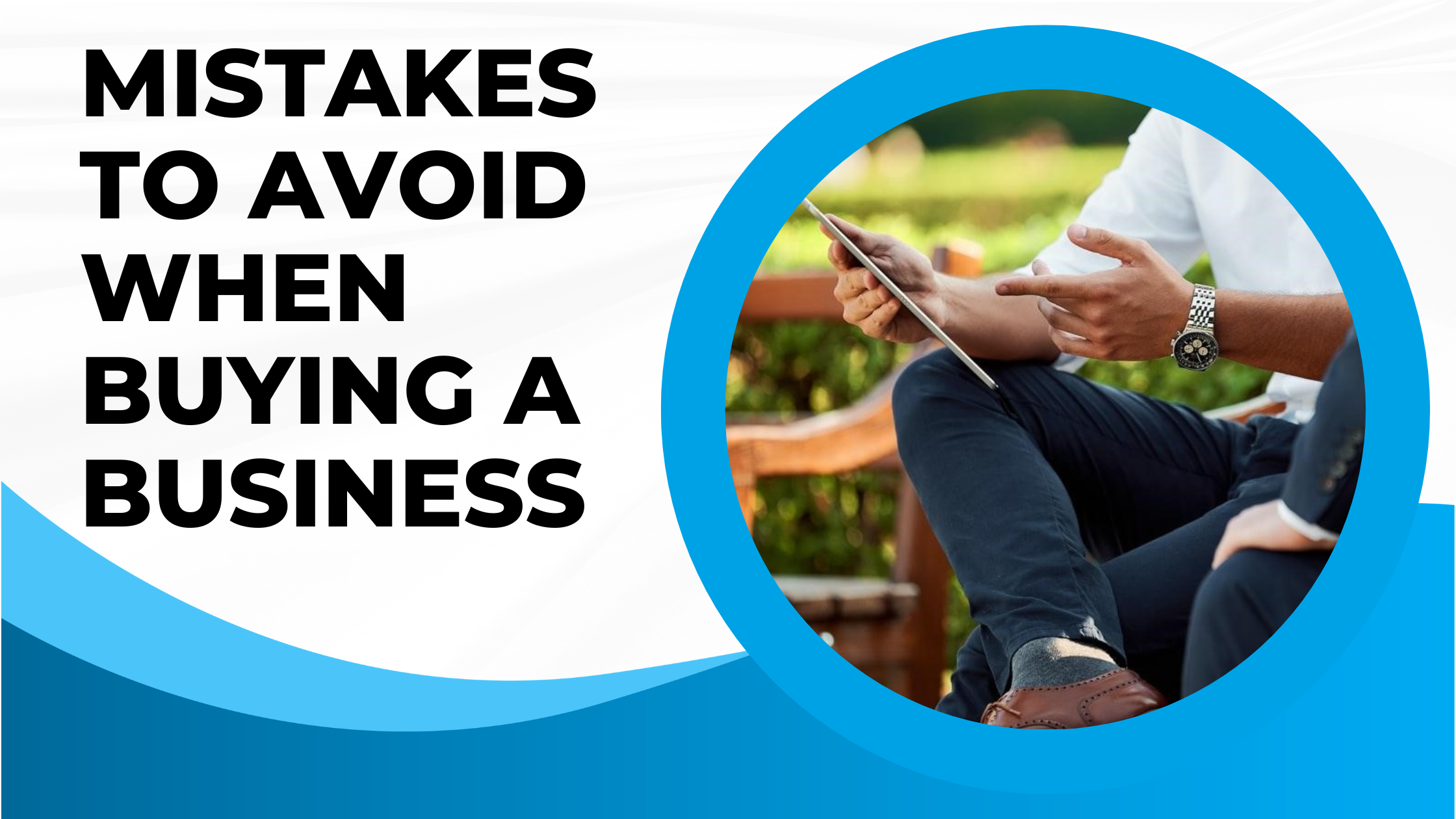We’ve all thought at one time or another about starting a business to have financial freedom and independence. Buying an existing business instead of starting one on our own can be a great option.
You can get several benefits when buying a business since you acquire a business model that already works. You also get established customers and a positive cash flow from day one.
Table of Contents
ToggleWhat can possibly go wrong?
However, although it can be a great opportunity, buying an existing business does not guarantee that the company will deliver the profits you expect.
Here are some tips you can follow and the most frequent mistakes you should avoid so you know how to buy a potentially successful business.
Learn the Reasons the Owner is Selling the Business
When looking for businesses to buy, do a lot of research regarding the business and the previous owner.
One of the most important questions is why the business is being sold. The answer you get may not be entirely true, but at least you will have an idea of the owner’s reasons for selling.
The business owner may be thinking of retiring or may have a medical condition that prevents them from managing the business. These reasons are valid, and it may be a great business to buy.
Dig deeper into the business
On the other hand, you should be careful to ask questions to dig deeper into all aspects of the business. For example, you can ask if any recent changes in the industry directly affect the business’s sales and if any indicators show that the business might not be viable in the future.
Continue your research by talking to some of the business’s customers, suppliers, employees, past business partners, and former company employees.
Only Buy at a Fair Price
If you purchase a business for more than it is worth, you risk the investment not working out and failing from the start.
Even if the business has good sales, many customers, high demand for the product, and a good reputation, if you pay too much, all the reasons you bought the business may not be worth it.
Negotiation is your best tool to get a fair price. You can also seek the advice of a broker or a seasoned small business owner specializing in buying and selling businesses.
Online calculators are resourceful tools and allow you to see an estimate of the value of a company.
You will not have exact results, but you can approximate the reality. The best thing to do is discuss your options with an experienced business buyer.
Organize Your Finances
Generally, a business buyer will seek external financing to buy a business. However, it is not impossible to buy a business without a business loan. Here are some options for buying a business without having a lot of money or going into debt by borrowing from an outside lender.
Find an owner who wants to be a passive investor:
You may find an owner who has worked in his business for many years and is now looking to retire but still needs income from his business.
In this case, it is possible to negotiate with the owner so that you can buy the business to manage it and continue to receive a percentage of the income.
You may be required to invest some money, but you will owe the owner a percentage of the income for several years. This is similar to owner financing, except that the owner’s payments will depend on the business’s success.
Buy a business that sells with seller financing:
Some people who want to sell their businesses offer a loan to the buyer. However, remember that almost no owner will lend 100% of the purchase price.
In this case, you could ask for the remaining money from a family member or an outside source to avoid investing your own money.
Go to other investors:
You may have to go elsewhere for assistance if you cannot buy the business through other means. This investor can help you purchase the business in exchange for a percentage of the business profits.
In addition, you can ask them to be a limited partner, meaning they have no responsibilities or active participation in the business and only contribute money.
Read the Purchase and Sale Papers Carefully

As we mentioned before, you must have professional help, such as an accountant or a lawyer, to handle the paperwork and the process of buying the business.
Even if you trust the people working with you, it is advisable that you get involved and read and analyze all the documentation to keep you aware of what you are negotiating.
With all the information at your disposal, you can make copies of all the operating agreements of the company you are buying to have all the necessary information.
This will allow you to learn and better understand your obligations within the business and be informed of relevant details that the previous owner may not have mentioned to you.
Documents You Must Have
Here are some documents you should have when you buy a business:
- Financial statements for the last few years
- The agreements that the company has entered into
- Tax returns
- Inventory records
- List of assets
Find Out About The Business Successes
The owners of some companies are often actively involved in the operation of the business. Sometimes the owners are in charge of management and decision-making. They are responsible for dealing with important customers and negotiating with suppliers.
In that case, the operation of the business is likely to be affected by the owner’s retirement or the transfer of ownership in general.
When you buy a business, you should inquire about the company’s operations. If you find that the business owner is critical to the success of the company’s earnings, you may want to consider asking the owner to remain as a consultant.
Conduct an Industry and Competitive Analysis
Many small business owners put their businesses up for sale at a time when profits are highest, so they can sell their businesses at a higher price.
But beware, this could be misleading. The easiest way to ensure that you make a good decision is to be well-informed about the general condition of the business.

5 Mistakes to Avoid When Buying a Business
As we have already mentioned, buying a business can be a good option if you don’t have the resources to start a new business from scratch.
Buying into a business brings quick benefits such as acquiring trained staff, assets, and established customers.
Buying a business also comes with certain risks, and just like starting a business from scratch, you need to make the smartest decisions to grow your business smoothly and prosperously.
Here are the 5 most common mistakes to avoid in the process of buying into a business:
1. Failing To Do Your Due Diligence
Due diligence is examining the legal, business, and financial records of the business you are about to purchase. Before you sign a contract and buy a business, you must do your due diligence.
Just because an existing business appears to be successful and profitable does not mean there are no hidden problems.
During the investigation, it is necessary to delve into the assets owned by the company, the debts owed, and the assets leased so that you can be sure of what you are acquiring along with the existing business.
Due diligence will also help you determine the right price to pay for a company to ensure a more profitable business in the future.
2. Buying A Business You Don’t Like
Never purchase the first available business that comes along. Instead, you want to wait for a business that can prove to be a profitable business down the line.
You also want to find something you are interested in, and that supports your long-term goals as a business owner.
Don’t be lured in by a good opportunity out of desperation because you’ve been looking for a long time. You are more likely to make a bad investment if you let yourself be guided by these emotions.
3. Overlooking the Company’s Brand Identity
Every company has an established image and brand that identifies it and represents the values under which it operates. Employees and customers become familiar with the brand image because they identify with it and its products or services.
Similarly, employees are accustomed to the company’s rules and policies, and preserving these customs and values is important.
Finally, it is very important to respect the brand image as this can directly affect the sales and success of the business.
Make sure when buying a business you know the culture well so that the flow and communication of the company are not disturbed.
4. Not Thinking About the Future of the Company
Transitioning from one owner to another can affect the company’s operation. Therefore, a proper strategy must be implemented for a smooth transition. This will help you avoid sudden staff departures or loss of customers.
Communicating plans in advance will create a more honest environment that will give you the confidence of your employees and customers. Be clear and precise about what will change in the company and your plans.
The transition of ownership is a process that may take months while the organization of teams and processes is being established. The key to success is communication.
5. Not Getting Advice from Professionals
When buying a business, it is easy to assume that financial operations are automatic and already established since it is an established business. This could be a serious mistake.
It is best to have a team of lawyers and financial advisors to guide you in the administrative part from the beginning.
The change of management may require certain strategies to fit the plans you have for your new company. If possible, you can work with professionals who already know the company and have worked with it before you bought it. This will give you the security of working with people who already know the company’s internal processes.

